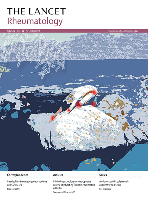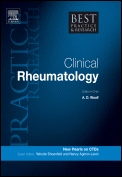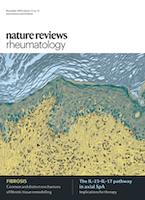
Arthritis & Rheumatology
Scope & Guideline
Connecting Researchers to Transformative Discoveries
Introduction
Aims and Scopes
- Pathophysiology of Rheumatic Diseases:
Research exploring the underlying biological mechanisms of various rheumatic diseases, including autoimmune responses, inflammation, and genetic factors. - Clinical Trials and Therapeutics:
Studies evaluating the efficacy and safety of new and existing treatments for rheumatic conditions, including biologics, JAK inhibitors, and other therapeutic modalities. - Patient Outcomes and Quality of Life:
Research focused on understanding how rheumatic diseases impact patients' quality of life, including studies on pain management, disability, and psychosocial factors. - Diagnostic Advances:
Innovative approaches to diagnosing rheumatic diseases, including imaging techniques, biomarkers, and clinical criteria. - Comorbidities and Multimorbidity:
Investigations into the prevalence and impact of comorbid conditions in patients with rheumatic diseases, and how these affect treatment and outcomes. - Health Disparities and Access to Care:
Studies addressing disparities in healthcare access and outcomes among different populations affected by rheumatic diseases.
Trending and Emerging
- Precision Medicine in Rheumatology:
An increasing focus on tailoring treatments based on individual genetic, biomarker, and clinical profiles to optimize therapeutic outcomes. - Digital Health and Telemedicine:
Research exploring the use of digital tools, telehealth, and remote monitoring in managing rheumatic diseases, particularly in the context of the COVID-19 pandemic. - Gut Microbiome and Autoimmunity:
Growing evidence linking gut health and microbiome composition with the development and exacerbation of rheumatic diseases, leading to novel therapeutic approaches. - Mental Health and Chronic Illness:
An emerging recognition of the intersection between mental health and rheumatic diseases, emphasizing the need for integrated care models that address psychological well-being. - Innovative Biomarkers for Disease Monitoring:
Research focused on identifying and validating new biomarkers that can accurately reflect disease activity and treatment response, enhancing patient management. - Environmental Influences on Disease:
Increased interest in how environmental factors, such as pollution and lifestyle, affect the onset and progression of rheumatic diseases.
Declining or Waning
- Traditional Pharmacotherapy Studies:
There has been a notable decrease in studies focusing solely on traditional DMARDs without incorporating newer biologic or targeted therapies. - Basic Science Research:
Research that does not directly translate into clinical applications or patient care has become less prevalent, as the journal increasingly emphasizes studies with practical implications. - Epidemiology Studies of Rare Conditions:
The frequency of epidemiological studies focusing on rare rheumatic diseases has decreased, possibly due to a shift towards more common conditions and their broader impacts. - Historical Perspectives and Reviews:
Fewer publications are dedicated to historical analyses or reviews of past treatments and outcomes, as the focus shifts towards current and future therapeutic strategies. - Conventional Imaging Techniques:
There is declining interest in conventional imaging studies, with a move towards more advanced imaging modalities and their applications in clinical practice.
Similar Journals

Lancet Rheumatology
Advancing knowledge in rheumatology and immunology.The Lancet Rheumatology, published by Elsevier, is a premier academic journal dedicated to advancing the understanding of rheumatology and immunological diseases. Launched in 2019, this esteemed publication has quickly become a leading source of research, achieving an impressive Q1 ranking in both the fields of Rheumatology and Immunology as of 2023. With Scopus rankings placing it at #2 out of 73 in Medicine - Rheumatology and #6 out of 233 in Medicine - Immunology and Allergy, the journal serves as an essential platform for disseminating high-quality, peer-reviewed articles that address the latest findings and clinical practices in these domains. The journal, accessible in print and online, is committed to fostering knowledge and collaboration among researchers, healthcare professionals, and students alike, making it an invaluable resource for those seeking to deepen their expertise in rheumatology and its interrelated fields.

Reumatologia Clinica
Pioneering the path to innovative rheumatology treatments.Reumatologia Clinica is a distinguished journal dedicated to the field of Rheumatology, published by Elsevier España SLU. With its ISSN of 1699-258X and E-ISSN 1885-1398, the journal aims to disseminate pivotal research findings and clinical studies from 2005 to 2024, spotlighting advancements in the understanding and treatment of rheumatic diseases. Based in Barcelona, Spain, it plays a vital role in the academic community, ranking in the Q3 category for Rheumatology as of 2023, with a Scopus ranking of #44 out of 73, placing it in the 40th percentile. Although it operates under a traditional access model, the journal is committed to academic excellence, providing researchers, healthcare professionals, and students with invaluable insights that drive the field forward. Reumatologia Clinica serves as an essential resource for those looking to deepen their knowledge and contribute to the evolving landscape of rheumatologic research.

Archives of Rheumatology
Innovative insights into the world of rheumatology.Archives of Rheumatology is a premier peer-reviewed journal dedicated to advancing the field of rheumatology through the dissemination of high-quality research, reviews, and case studies. Published by the Turkish League Against Rheumatism, this open-access journal provides a platform for researchers, clinicians, and students to share insightful findings and innovative approaches in the diagnosis and management of rheumatologic diseases. With the goal of promoting knowledge exchange on a global scale, the journal welcomes submissions that enhance understanding and foster advancements in the clinical and biological aspects of rheumatic conditions. Each publication contributes significantly to the growing body of literature in this vital field of medicine, making Archives of Rheumatology an essential resource for both established and emerging researchers looking to stay abreast of the latest developments and clinical practices.

BEST PRACTICE & RESEARCH IN CLINICAL RHEUMATOLOGY
Advancing Clinical Excellence in RheumatologyBEST PRACTICE & RESEARCH IN CLINICAL RHEUMATOLOGY, published by Elsevier, stands as a premier journal in the field of rheumatology, holding a prestigious Q1 ranking in both Medicine (miscellaneous) and Rheumatology categories as of 2023. With an ISSN of 1521-6942 and an E-ISSN of 1521-1770, the journal is dedicated to advancing clinical knowledge and practice through the dissemination of high-quality, peer-reviewed research. Since its inception in 1995, this journal has provided a platform for researchers, clinicians, and healthcare providers to share significant advancements, best practices, and innovative insights that shape the standards of care in rheumatology. The commitment to open access publishing reflects its mission to broaden the reach of critical research findings, ensuring that professionals across the globe can access valuable information in this vital field. The journal's impressive Scopus ranking, positioned at #10 out of 73 in Medicine-Rheumatology, alongside its notable impact factor, underscores its importance and influence in guiding clinical practice and policy in rheumatologic conditions. By engaging with this journal, readers can stay informed about emerging trends and evidence-based strategies that are crucial for improving patient outcomes.

SEMINARS IN ARTHRITIS AND RHEUMATISM
Elevating research standards in arthritis and rheumatism.SEMINARS IN ARTHRITIS AND RHEUMATISM, published by W B Saunders Co-Elsevier Inc, is a leading journal in the fields of rheumatology and pain medicine. With an impressive impact factor and recognized as a Q1 journal in both its categories, it ranks #8 in Anesthesiology and Pain Medicine and #11 in Rheumatology based on the latest Scopus data, placing it within the top echelons of academic research. Established in 1971, this esteemed publication offers a comprehensive platform for researchers and practitioners to disseminate and engage with cutting-edge studies that advance the understanding and treatment of arthritis and related conditions. With its robust editorial process and focus on high-quality, peer-reviewed articles, the journal not only contributes to scientific knowledge but also serves as an essential resource for professionals and students seeking contemporary insights into effective management strategies and emerging therapies in the rheumatologic field. Although it does not offer open access, its subscription model ensures a wide distribution among academic and clinical institutions, reinforcing its significance in the research community.

Nature Reviews Rheumatology
Connecting global expertise in rheumatology.Nature Reviews Rheumatology is a premier academic journal published by NATURE PORTFOLIO, dedicated to the field of rheumatology. With an impressive impact factor reflecting its high citation rate and relevance within the scientific community, it ranks in the Q1 category for rheumatology, showcasing its essential role in disseminating cutting-edge research and reviews. The journal serves as a vital resource for researchers, clinicians, and students alike, presenting comprehensive articles that cover the latest developments, therapeutic advancements, and emerging trends in rheumatic diseases. With access options, including open access, it ensures that valuable insights are within reach for all stakeholders in the field. Situated in the United Kingdom and intersecting with a global audience, Nature Reviews Rheumatology stands as an authoritative voice, fostering education and innovation to improve patient outcomes and enhance the understanding of rheumatological conditions.

ZEITSCHRIFT FUR RHEUMATOLOGIE
Advancing knowledge in rheumatology since 1974.ZEITSCHRIFT FUR RHEUMATOLOGIE, published by Springer Heidelberg, serves as a vital platform in the field of rheumatology, providing researchers, clinicians, and students with cutting-edge findings and discussions related to the diagnosis, treatment, and management of rheumatic diseases. Since its inception in 1974 and continuing until 2024, this journal retains its commitment to disseminating significant scientific work within this specialized domain. Although it is currently categorized in the Q4 quartile for Rheumatology and ranks 47 out of 73 in Scopus, reflecting its burgeoning presence, the journal is dedicated to evolving and gaining prominence in the academic community. By offering valuable insights and fostering scholarly discourse, ZEITSCHRIFT FUR RHEUMATOLOGIE plays a crucial role in advancing rheumatology research and enhancing patient care practices worldwide. The journal presents an opportunity for its readers to engage with contemporary studies and enrich their understanding of rheumatic ailments.

CLINICAL AND EXPERIMENTAL RHEUMATOLOGY
Fostering innovation for better patient outcomes.CLINICAL AND EXPERIMENTAL RHEUMATOLOGY is a prestigious journal published by CLINICAL & EXPER RHEUMATOLOGY, dedicated to advancing the field of rheumatology and immunology. With a rich history dating back to 1983, the journal serves as a critical platform for researchers, clinicians, and professionals seeking to disseminate and discuss innovative findings in these rapidly evolving areas. Featuring an impressive Q2 ranking in both Immunology and Allergy, as well as Rheumatology, this journal is recognized for its high-quality contributions, placing it among the top tier of academic publications. Operating without an open access model, CLINICAL AND EXPERIMENTAL RHEUMATOLOGY is headquartered in Pisa, Italy, and publishes articles that undergo rigorous peer review to ensure excellence in research. This journal is an invaluable resource for those dedicated to improving patient outcomes through evidence-based practice in rheumatology, immunology, and related fields.

RHEUMATOLOGY INTERNATIONAL
Transforming understanding through rigorous research.Rheumatology International, published by Springer Heidelberg, is a prestigious journal that focuses on innovative research in the field of rheumatology and immunology. Established in 1981, this peer-reviewed journal has contributed significantly to advancing our understanding of autoimmune disorders, clinical approaches, and therapeutic interventions. It holds a commendable Q2 ranking in the categories of Immunology, Immunology and Allergy, and Rheumatology as of 2023, showcasing its influence and importance within these disciplines. With a robust Scopus ranking—positioned 14 out of 73 in Medicine Rheumatology—it caters to a diverse audience of researchers, clinicians, and students committed to improving patient care and treatment modalities. Although it does not currently offer open access options, the journal remains a vital resource for insights on contemporary challenges and breakthroughs in rheumatological research, published from its base in Heidelberg, Germany.

RHEUMATIC DISEASE CLINICS OF NORTH AMERICA
Unveiling innovations in rheumatic disease management.Rheumatic Disease Clinics of North America is a premier journal published by W B Saunders Co-Elsevier Inc, dedicated to advancing the field of rheumatology through comprehensive and impactful research. With an ISSN of 0889-857X and an E-ISSN of 1558-3163, this esteemed publication has been disseminating knowledge since its inception in 1987, and continues to guide clinicians and researchers alike through its insightful articles and case studies. Positioned in the 2023 Q2 quartile for Rheumatology, it ranks #31 out of 73 journals in the Scopus category of Medicine _ Rheumatology, reflecting a commendable impact factor and relevance in the academic community. Although it does not offer open access options, the journal ensures that subscribers have access to cutting-edge research and reviews that address contemporary challenges and advancements in rheumatic disease. With its authoritative content, Rheumatic Disease Clinics of North America serves as a vital resource for those striving to improve patient care and clinical outcomes in the ever-evolving landscape of rheumatology research.